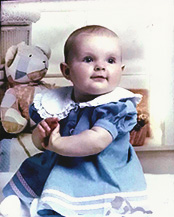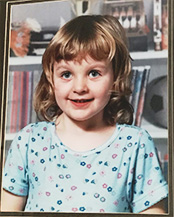A Young Woman’s Journey through Autism
August 30, 2023

 |
By: Pivot Point Family Growth Centre |
A Young Woman’s Journey Through Autism
The journey of an autistic child can be challenging. Autism is a neurodevelopmental disability that can affect communication, social interaction and behavior, creating a unique set of challenges and opportunities. The characteristics of autism can vary widely and may include difficulty with language and self expression, atypical social skills, repetitive behaviors, and sensory sensitivities. It can be difficult for individuals with autism to navigate the world around them, and they may require additional supports and accommodations to thrive. Yet many others believe they thrive BECAUSE of their Autism. For example, many autistic people excel in areas that they are passionate about, and where they can leverage some of their greater talents and strengths.
Examples include strengths in math, computer programming, engineering, music, art and many other important fields. Parents, educators, and caregivers are encouraged to understand and embrace the strengths and challenges of each individual autistic/neurodivergent child in order to help them reach their full potential. With early intervention, support, and acceptance of their unique traits, many autistic children lead fulfilling lives and make significant contributions to their communities and the world around us.
The Early Years
 Shana Harrison was first diagnosed with Autism at the young age of 4 years old. At that time, a 2002 CDC Report said that autism diagnoses occurred every 1 in 150 children, with a ratio of approximately four boys to every one girl. By 2020 that number changed dramatically to 1 in 36 children identified as being on the spectrum. If it was not for a daycare provider suggesting that she may be autistic, Shana may have been diagnosed at a much later age, which is an unfortunate reality for many families who live in the uncertainty of not knowing.
Shana Harrison was first diagnosed with Autism at the young age of 4 years old. At that time, a 2002 CDC Report said that autism diagnoses occurred every 1 in 150 children, with a ratio of approximately four boys to every one girl. By 2020 that number changed dramatically to 1 in 36 children identified as being on the spectrum. If it was not for a daycare provider suggesting that she may be autistic, Shana may have been diagnosed at a much later age, which is an unfortunate reality for many families who live in the uncertainty of not knowing.
Sadly, during her early education, her grade one teacher with well meaning intentions, created a “VIP” Student System in which whoever was the VIP student that week had to play with Shana at lunch. Because the students were “voluntold” to play with Shana, this left some of them upset if they had wanted to play with someone else. Seeing this made Shana very sad as she did not know why they were being made to play with her and because they were upset, she thought that playing with her was a bad thing. Shana also had to wear a weighted vest, to prevent her from stimming, which – for her – involved jumping up and down. Because of this, Shana felt like she “stuck out like a sore thumb”. This made her social interactions far more uncomfortable, driving her to withdraw even further from feeling confident about connecting with her peers. It wasn’t until Shana reached age 8 that she started to really have a sense that she was different. Shana desperately wanted to fit in and not be seen as the “weird kid” by her peers.
It is important to note that although weighted vests may work for some autistic children in calming them down, Shana personally wanted something more discrete, such as a lap pillow. Every autistic individual is different and what works for some may not work for others. It is also important to note that throughout the autism world, stimming is typically no longer a target for intervention unless it causes harm or is disruptive. This is because for many autistic individuals, stimming helps them to self regulate their emotions when they are feeling overwhelmed. Depriving them of this can lead some to become very dysregulated, which can cause meltdowns or other adverse mental health outcomes such as anxiety and depression.
Why Am I Different? Atypical vs. Neurodivergent
 Most children in elementary school are developing their social and academic skills… even though they may feel different, or appear to do things differently from others. They are often curious and eager to learn, asking questions and seeking new experiences. At this age, they may start to become more independent in their daily routines and decision-making. Many also tend to have more established friendships and engage in more complex play and social activities. For neurodivergent children, early intervention ABA support can make a huge positive impact towards coping with or overcoming challenges in behavioural health. Similarly, Mental health supports such as calming strategies, emotion regulation techniques, identity work and having educational supports such as opportunities to take a break and walk around can also have a huge positive impact towards helping autistic children grow and thrive.
Most children in elementary school are developing their social and academic skills… even though they may feel different, or appear to do things differently from others. They are often curious and eager to learn, asking questions and seeking new experiences. At this age, they may start to become more independent in their daily routines and decision-making. Many also tend to have more established friendships and engage in more complex play and social activities. For neurodivergent children, early intervention ABA support can make a huge positive impact towards coping with or overcoming challenges in behavioural health. Similarly, Mental health supports such as calming strategies, emotion regulation techniques, identity work and having educational supports such as opportunities to take a break and walk around can also have a huge positive impact towards helping autistic children grow and thrive.
For Shana, there were so many “different” things in her journey that just didn’t make sense to her. This included the beginning of her connection with Pivot Point. Starting with childcare support at age 8, Shana’s services included working on building social skills, making friends, trying to manage annotations that were too loud or too fast, learning to recognize social cues, working with a tutor, and trying to fit in with her peers. In short, it was a lot to deal with, let alone grasp in her neurodivergent mind. Thankfully Shana had amazing child care workers who helped her to feel more confident in her social interactions; they were there for her during challenging times. “It’s so important to be human in this line of work,” Shana says “Because us spectrum kids really value connection and having people that care about us as people and that help us embrace our uniqueness rather than “fix” our traits.”
The Bonds That Bind Us in Strength
Shana remembers having a strong bond with both her parents overall from an early age, especially with her mother. By the age of eight, she started to question why she was receiving one-to-one support… and why she was different in so many ways. She began questioning so many things that she was having to learn as part of her daily life. Finally, two weeks before her 10th Birthday, Shana’s mom told her that she was autistic, and said that the reason she waited to tell her was because she wanted Shana to be able to understand what was happening. Shana’s mom explained that Autism “was not a disease”, and that Shana’s brain just worked differently. This went a long way towards helping her mental health. According to Shana, “that was the BEST DAY” for her, as she finally could put all the pieces together in her mind. Until that day, Shana’s mental health was poor, leaving her feeling so lost, lonely, and inadequate as she was always comparing herself to her peers. Receiving her autism diagnosis gave her answers and an identity, which then inspired her to learn more about it and her strengths associated with it.
Sadly, learning about her diagnosis wasn’t the end of her struggles. Throughout her school years, Shana experienced bullying from her peers. She credits her family’s love for her, receiving counselling, and her friend group for helping her get through such a difficult time as a young girl. Her parents also inspired her to take a strengths based approach to her autistic identity. This was pivotal for Shana because after looking up successful autistic people such as Satoshi Taijiri, the creator of Pokémon, she became inspired to view autism as a difference and not a deficit. Although Shana is extremely grateful to have met some of her closest friends in high school, she also encourages neurotypical people to educate themselves about autism so that they are more empathetic and understanding. She also strongly advocates against making fun of them because they are different or excluding them because they think they are weird. “Don’t make autistic people’s lives harder than they already are” Shana advises.
Growth Mindset Leads to Success
 While Shana’s services were adjusted through the years to match her needs, the focus became less about behavioral support needs and more about her mental health. Shana states that near the end of services, she wanted to embark on a new journey that included teen transition planning. She was grateful for her family’s support for helping her towards planning her post secondary education, and envisioning what her adulthood might look like. Shana credits the transition program with showing her the visionary path towards her own success story.
While Shana’s services were adjusted through the years to match her needs, the focus became less about behavioral support needs and more about her mental health. Shana states that near the end of services, she wanted to embark on a new journey that included teen transition planning. She was grateful for her family’s support for helping her towards planning her post secondary education, and envisioning what her adulthood might look like. Shana credits the transition program with showing her the visionary path towards her own success story.
By age 19, Shana no longer required support services. Two months later, based on recommendations from the staff, she applied for a job at Pivot Point, and was hired as a Child Care Worker, and shortly after, she applied and was accepted as a student at Simon Fraser University!
Today Looks Bright for Tomorrow
Currently, Shana continues to grow her career path here at Pivot Point while working on her master’s in counselling psychology. Her goal? To eventually pursue doctoral studies and become a Clinical Psychologist. Shana is currently working on her thesis about how masking or the hiding of autistic traits impacts the mental health of autistic women and hopes to continue working in the autism field both as a therapist and as a researcher. Throughout her work, Shana has come to view her lived experience as an invaluable asset.
When asked about the best advice she could offer parents about their child’s new diagnosis of autism, Shana had this to share:
“The best advice to new parents with an autistic child, is to know there will be ups and downs, hard times, and that it will be scary for both you and your child. Despite this, try to approach things from a strengths-based perspective. Introduce them to successful autistic individuals (She credits her own parents having these important qualities during her autistic journey). It is also important to be patient and to try and see from your child’s point of view. By doing that, you will develop a greater sense of empathy and compassion.
Parents are naturally concerned for their child’s future. Children and teens have special interests, if you’re worried, try to encourage them to pursue education or a career that is geared towards their special interests. What are they good at? What do they enjoy doing? What sparks the best version of themselves? Whatever it is, foster their creativity and passion!”
Reflections from Pivot Point’s Directors:
“Shana has been an incredible addition to the Pivot Point family throughout all of her stages with us! Her smiling face is always welcome. By learning to have the courage to be herself, Shana has taught many of us at Pivot Point how to show up and shine! The main reasons for Shana’s growth and success stem from her own drives, hopes and dreams… and from her incredibly supportive family. Shana has always demonstrated a willingness to work hard towards the things that were important to her. Her team celebrated every success with her, and then raised the bar a little more each time. She’s had ongoing involvement in the decision making around which services she most needs in order to continue growing. Shana’s mother and father have always been highly involved, highly supportive and involved in all aspects of program development and support. We are so very proud of Shana and how far she has come in all aspects of her life. We can’t wait to see where she goes next, and to watch her expand the positive impact she has on the lives of others around her!” (Steve & Crystal)


 Ontario Regional Manager
Ontario Regional Manager

 Complex Care Program Manager
Complex Care Program Manager Adult Services & Transition Planning Program Manager
Adult Services & Transition Planning Program Manager



